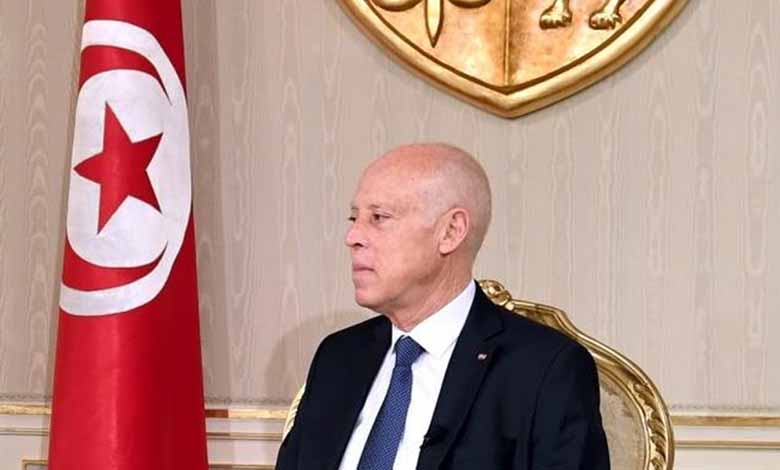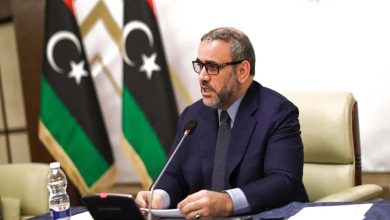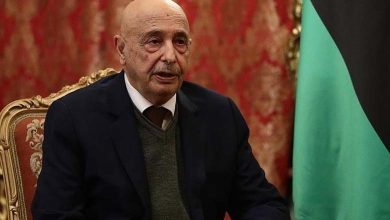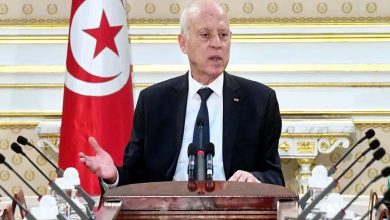Kais Saied Holds Lobbies Responsible for the Escalation of the Bread Crisis

Tunisian President demands urgent measures from the government to confront the crisis, emphasizing that the bread of Tunisians is a red line. President Kais Saied stressed the necessity of addressing the bread crisis that has been plaguing the country, calling on his government to take “urgent actions” related to providing this essential commodity for Tunisians, holding “lobbies” responsible without naming them for the situation, while the opposition uses the crisis as a card to pressure the president and hold him responsible for the deterioration.
Saied said during a speech at a meeting in the government palace in the capital, Tunis, with Prime Minister Najla Bouden and Finance Minister Sihem Boughdiri, published by the presidency on its official Facebook account, that “urgent measures related to bread must be taken,” confirming the existence of “manipulation.”
Tunisia has been experiencing a shortage of bread for days, and citizens stand in long queues for hours to obtain it, according to local media and posts on social media platforms where citizens express their anger over the lack of flour, while the opposition exploits the crisis as a tool to pressure the president and condemn his rule.
The Tunisian President pointed to the suffering of citizens in obtaining bread, waiting in queues for many hours, affirming that this situation is no longer acceptable, and demanding that the government take responsibility in front of the citizens.
He questioned the reason for citizens not receiving their needs from government-subsidized bakeries while obtaining it from other non-subsidized ones, stating that there is a “twisted method of removing support from grains” and calling for an immediate halt to it.
In Tunisia, there are classified bakeries considered government-subsidized, selling one loaf for 190 millimes ($0.033), and other non-subsidized ones with prices set freely.
The President pointed to the existence of “lobbies” working in secret to fuel the situation and tamper with the strength of Tunisian citizens, without naming a specific entity, emphasizing that playing with the bread of Tunisians is a “red line.”
And he revealed that “in Tunisia, there are 3,337 classified bakeries (selling at government-regulated prices), and 1,443 unclassified bakeries (with free prices)”, considering that “the latter wants to starve the Tunisians.”
Tunisia is suffering from a scarcity of resources and foreign exchange, with a budget deficit, and all efforts so far have failed to obtain a $1.9 billion loan from the International Monetary Fund to supply essential materials, including grains, amidst Russia’s decision not to extend the grain agreement with Tunisia during the crisis.
This is not the first time that the Tunisian President has accused lobbies and opportunists of being behind the bread crisis in the country. In a recorded speech on May 23rd, he emphasized that “citizens’ bread and basic materials must be available, and this is the role of the Ministry of Agriculture and the Grain Office (governmental) and all relevant administrations in the state, which must confront monopolists and those who undermine the strength of Tunisians.”
Since 2021, Tunisia has experienced a decline in grain production due to climatic reasons, and its repercussions have reached the local markets after a few months, as there is a lack of reassuring quantities of hard wheat used in bread production.
The government found that the solution lies in resorting to imports, but obstacles hindered this due to the financial crisis the country is going through.
Tunisia imports over 60% of its needs of this material, mostly from Russia and Ukraine.
Tunisia has requested supplies of grains at preferential prices from the Republic of Tatarstan, given the significant shortage of grain crops this year due to drought and climatic factors.
Nabil Ammar, the Minister of Foreign Affairs, presented the request to Rustam Minnikhanov, the President of Tatarstan, one of the federal entities of the Russian Federation, during talks at the Economic and Humanitarian Forum in the Russian capital, Moscow.
The Tunisian Foreign Ministry quoted Nabil Ammar on Thursday, saying, “The Tunisian side needs to import grains and obtain preferential prices, especially since Tunisia is suffering from a scarcity of agricultural crops during this period due to specific climatic conditions, while significant quantities of grains are available in many other countries.”
The Tunisian Minister also submitted a parallel request to the Russian Foreign Minister for the importation of Russian grains and fertilizers under the best conditions, according to the same source.
The Ministry of Agriculture in Tunisia had previously announced the collection of 2.7 million quintals of grain, recording a decline of about 60% in national production this year compared to the previous season.












